I am looking to wrap the following formula into a function for easier end use:
df %>%
group_by(a, b) %>%
summarize(avg=mean(c)) %>%
ggline(x="a", y="avg", color='b')
however the following returns the error "Error in is.factor(x) : object 'b' not found" even though is.factor(df$b) == TRUE
graph_var <- function(data_source, var) {
var2 <- enquo(var)
data_source %>%
group_by(a, !!var2 )%>%
summarize(avg=mean(c)) %>%
ggline(x="a", y="avg", color=shQuote(var) )+ grids(linetype = 'dashed')
}
graph_var(df, b)
I'm sure the issue lies somewhere around ggpubr using quotes in its arguments, but I can't track down exactly what I need to do get this to work.
For reproducibility:
library(tidyverse)
library(ggpubr)
set.seed(13)
df <- data.frame(
a = rep(1:10),
b = as.factor(rep(LETTERS[24:26], each = 10)),
c = rnorm(30)
)
#explicit declatation - this works
df %>%
group_by(a, b )%>%
summarize(avg=mean(c)) %>%
ggline(x="a", y="avg", color="b" )+ grids(linetype = 'dashed') #works
#declaired via variable, this also works
test_var <- "b"
df %>%
group_by(a, b )%>%
summarize(avg=mean(c)) %>%
ggline(x="a", y="avg", color=test_var )+ grids(linetype = 'dashed') #also works
#declaited via f(x) - yeilds error "Error in is.factor(x) : object 'b' not found"
graph_var_ex <- function(data_source, var) {
var2 <- enquo(var)
data_source %>%
group_by(a, !!var2 )%>%
summarize(avg=mean(c)) %>%
ggline(x="a", y="avg", color=shQuote(var) )+ grids(linetype = 'dashed')
}
graph_var_ex(df, b)
